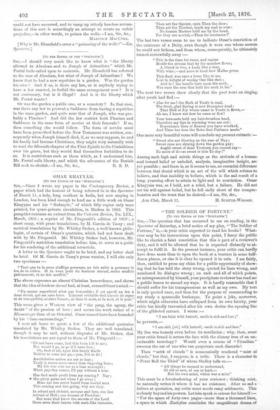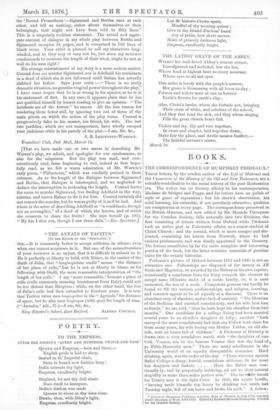"THE SOLDIER OF FORTUNE."
(TO THE EDITOR OF THE “SPEOTITOR.1
Sin,—The question that has occurred to me on reading, in the- Spectator of Saturday, a brief notice of my play, " The Soldier of Fortune," is,—is your critic expected to read his books? What- ever may be his instructions upon this point, I fancy the public- like to cherish a faint conviction that this is part of a reviewer's duty, and it will be allowed that he is expected distantly to at- tempt to fulfil it. In the present instance, your critic can hardly have done more than to open the book at a venture in some half- dozen places, or else it is clear he opened it in vain. I am fairly, then, entitled to press my claim for a public opportunity of show- ing that he has told the story wrong, quoted its lines wrong, and, numbered its dialogue wrong ; on each and all of which points, as misrepresented by himself, your precipitate reviewer has read me a public lesson to amend my ways. It is hardly reasonable that I should suffer for his transgressions as well as my own. My text is only quoted once, and then for the purpose of commending to- my study a spasmodic burlesque. To point a joke, moreover, which might otherwise have collapsed from its own fatuity, your critic has kindly travestied after his own device the opening line of the gibbeted extract. I wrote :— " I am faint with hatred ; earth is sick and leer ;" he perverts,- " I am sick [sic] with hatred ; earth is sick and leer." My line was homely even before its mutilation ; why, then, must your critic brand it across the face with the clumsy iron of an un- endurable tautology ? Would even a course of " Firmilian sweeten the ear of one who can perpetrate such discords?
Then " mirk of clouds " is nonsensically rendered " mist of clouds," but that, I suppose, is a trifle. There is a character in "Peter Bell the Third" of whom Shelley tells us :—
"All things be seemed to understand, Of old or new, of sea or land,—
But his own mind, which was a mist."
This must be a foreshadowing of your reviewer ; thinking mist, he naturally writes it where it has no existence. After so sad a failure at quotation, my critic must needs essay arithmetic. This is clearly beyond his powers. Lethim speak in extenso for himself :— "For the space of forty-two pages—more than a thousand lines, a space in which 2Eschylus concludes the magnificent drama of
the ' Bound Prometheus'—Sigismund and Bertha rant at each other, and tell us nothing, either about themselves or their belongings, that might not have been told in fifty lines.'' This is a singularly reckless statement. The actual and aggre- gate amount of dialogue in my whole play between Bertha and Sigismund occupies 34 pages, and is comprised in 762 lines of blank verse. Your critic is pleased to call my characters long- winded, and so they may or may not be, but since my reviewer condescends to measure the length of their wind, might be not as well do his sum right?
His strange misstatement of my story is a more serious matter. Conrad does not murder Sigismund, nor is Adelheid his confidante in a deed of which she is not informed until Raban has actually stabbed her father. Says your critic :—" There is no really dramatic situation, no genuine tragical power throughout the play." I have some hopes that he is as wrong in his opinion as he is in his statement of fact. In any case, it appears plain that he has not qualified himself by honest reading to give an opinion. " The incidents are of the fewest," he sneers. All the less reason for rendering them fewer still, by ignoring two out of three of the main pivots on which the action of the play turns. Conrad is progressively false to his master, his friend, his wife. The last two perfidies, which are not unimportant, have wholly escaped your judicious critic in his parody of the plot.—I am, Sir, &c., [That we have made one or two errors in describing Mr. Warren's play, we admit, and apologise for our .carelessness, as also for the misprints. But the play was read, and con- scientiously. read, from beginning to end, indeed at first hope- fully read, as we felt a warm admiration of Mr. Warren's early poem, "Philoctetes," which was cordially praised in these columns. As to the length of the dialogue between Sigismund and Bertha, that dialogue is interrupted, and we neglected to deduct the interruption in reckoning the length. Conrad leaves the room to murder Sigismund, but finding Adelheid in the way, returns, and leaves Raban to do it for him. Conrad certainly did not commit the murder, but he was as guilty of it as if he had. And where is the error of describing Adelheid as "a confidante, though not an accomplice," of a deed of which she knows, and of which she consents to share the fruits ? She says herself (p. 193), " My kin I slew not, though I saw them slain."—En. Spectator.]



































 Previous page
Previous page